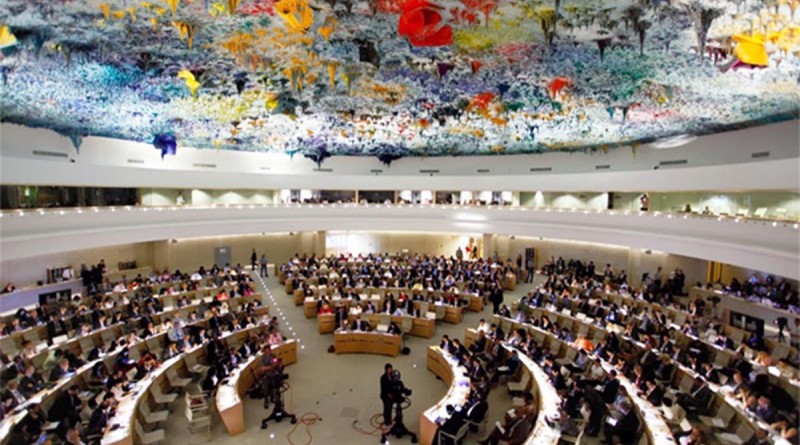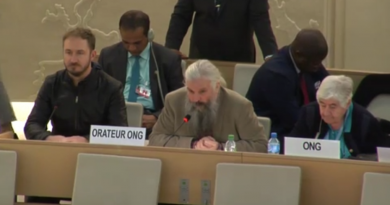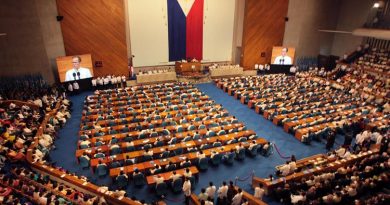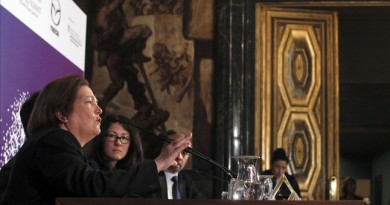CGNK takes SDGs to the UN Human Rights Council
The Center for Global Nonkilling, in its capacity of non-governmental organization in special consultative status with the United Nations Economic and Social Council, submitted a formal written statement to the UN Secretary General addressing the 27th session of the Human Rights Council, that is being held in Geneva between September 8-26, 2014.
CGNK’s written statement “Supporting the Inclusion of the Prevention and Reduction of Killing in the Post-2015 Development Agenda” will be discussed as part of the Annual report of the United Nations High Commissioner for Human Rights and reports of the Office of the High Commissioner and the Secretary-General. The English, French, and Spanish versions of the statement can be downloaded here or from the official UN documentation site under reference number A/HRC/27/NGO/114.
Supporting the Inclusion of the Prevention and Reduction of Killing in the Post-2015 Development Agenda
The process leading to the post-2015 developing agenda in which the UN will define the global development framework to succeed the Millennium Development Goals (MDGs) will finalize next year. This new framework will be crucial to determine the global approach of some of the most pressing problems of our time, and it is a unique opportunity to include violence prevention and reduction as a key measurable factor to achieving development goals.
Considering the promotion and protection of the right to development is among the directives provided by the General Assembly in its resolution 48/141 establishing the post of UN High Commissioner for Human Rights and that the OHCHR has been supportive of a post-2015 development agenda based on human rights, the Center for Global Nonkilling appeals to the Office of the United Nations High Commissioner for Human Rights to call for the incorporation of the right not to be killed and the right not to kill, in the form of goals for the prevention and reduction of lethal and other forms of violence as part of the post-2015 development agenda.
Such a call would find basis in the ‘Promoting Development through the Reduction and Prevention of Armed Violence’ resolution (A/RES/63/23)—adopted by consensus in the plenary session of the UN General Assembly on 17 November 2008 under the agenda item ‘Follow-up to the Outcome of the Millennium Summit’ and on the UN Secretary-General’s report on ‘Promoting Development through the Reduction and Prevention of Armed Violence’ (A/64/228), presented to the UN General Assembly on 16 November 2009. The Geneva Declaration on Armed Violence and Development, to which more than 100 countries are now signatories, also supports such a consideration.
Seconding the call of the late Assistant Secretary-General and first Chancellor of the UN-mandated University for Peace Robert Muller ‘to place the right of each human person not to kill and not to be killed at the top of the list’ (1982), the Charter for a World without Violence approved by the World Summit of Nobel Peace Laureates incorporates the following principle: ‘In implementing the principles of this Charter we call upon all to work together towards a just, killing-free world in which everyone has the right not to be killed and responsibility not to kill others.’ Including the prevention and reduction of lethal violence in the a post-2015 development agenda and the measurable data on violent deaths as an indicator of its achievement will be a significant step toward the recognition of the human right to life.
We currently know enough to drastically reduce violence. Supportive evidence for the Geneva Declaration on Armed Violence and Development present a reality in which armed violence is not only a cause for underdevelopment but also a consequence of the common risk factors that underlie its patterns. The 2002 World Health Organization World Report on Violence and Health presented violence as a ‘preventable disease’ emphasizing different prevention strategies and recommendations. The forthcoming Global Status Report on Violence Prevention, that will appear in late 2014, evaluating the implementation of the 2002 recommendations, will provide additional evidence on how putting our existent knowledge on violence prevention into practice can have a significant impact on achieving security and development.
At the Center for Global Nonkilling, a participant of the WHO Violence Prevention Alliance as well as an NGO in special consultative status, we are confident that the inclusion of the prevention and reduction of killing as a measurable component of the post-2015 development agenda will help bring about the necessary social, political and institutional momentum to expand and put our existing knowledge and evidence-backed violence prevention policies, programs and strategies into practice, opening an opportunity for building safe killing-free communities around the world.




